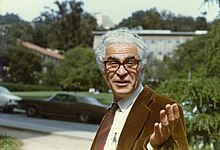Maxwell rose light
Maxwell Alexander Rosenlicht (born April 15, 1924 in Brooklyn , † January 22, 1999 in Hawaii ) was an American mathematician who dealt with algebraic geometry, algebraic groups and differential algebra.
Life
Rosenlicht went to school in Brooklyn (Erasmus High School) and studied at Columbia University (Bachelor in 1947) and at Harvard University , where he received his doctorate in 1950 under Oscar Zariski ( Equivalence Concepts on an Algebraic Curve ). In 1952 he went to Northwestern University . From 1958 until his retirement in 1991 he was a professor at Berkeley University , where he was chairman of the mathematics department from 1973 to 1975. He has also been visiting professor in Mexico City , IHES , Rome , Leiden and Harvard.
In 1960 he and Serge Lang received the Cole Prize in Algebra for his work on Jacobi varieties . He also dealt with the algorithmic algebraic theory of integration, where his student Robert Risch made a breakthrough in 1968.
Rosenlicht was a Fulbright Fellow and a 1954 Guggenheim Fellow.
He died on a trip to Hawaii of a neurological condition from which he had suffered for a long time. Rosenlicht had been married since 1954 and had four children.
Michael F. Singer is one of his doctoral students .
Fonts
- Liouville's Theorem on Functions with Elementary Integrals . In: Pacific Journal of Mathematics , Vol. 24, No. 1, 1968, pp. 153-161.
- Introduction to Analysis. Scott, Foresman, 1968; Dover Publications, 1985, ISBN 0-486-65038-3 .
- Integration in finite terms . In: The American Mathematical Monthly , Volume 79, 1972, pp. 963-972, JSTOR 2318066 .
literature
- Pierre Samuel : Travaux de Rosenlicht sur les groupes algébriques . In: Séminaire Bourbaki , 145, 1956/57
- Jean-Louis Koszul : Relations d'équivalence sur les courbes algébriques ayant des points multiples, d'après M. Rosenlicht . In: Séminaire Bourbaki , No. 75, 1952/53
- Jean-Louis Koszul : Les variétés jacobiennes généralisées, d'après M. Rosenlicht . In: Séminaire Bourbaki , No. 93, 1953/54
Web links
- to rose light. Mathematics Genealogy Project
- Obituary. Berkeley
- Rose light at the University of Berkeley
- Brian Conrad: Impossibility theorems on integration in elementary terms . (PDF) Introduction to the theory of Rosenlicht
Individual evidence
- ↑ Generalized Jacobian varieties . In: Annals of Mathematics , Volume 59, 1954, pp. 505-530. A universal mapping property of generalized Jacobians. In: Annals of Mathematics , Volume 66, 1957, pp. 80-88
| personal data | |
|---|---|
| SURNAME | Rosenlicht, Maxwell |
| ALTERNATIVE NAMES | Rosenlicht, Maxwell Alexander (full name) |
| BRIEF DESCRIPTION | American mathematician |
| DATE OF BIRTH | April 15, 1924 |
| PLACE OF BIRTH | Brooklyn |
| DATE OF DEATH | January 22, 1999 |
| Place of death | Hawaii |
